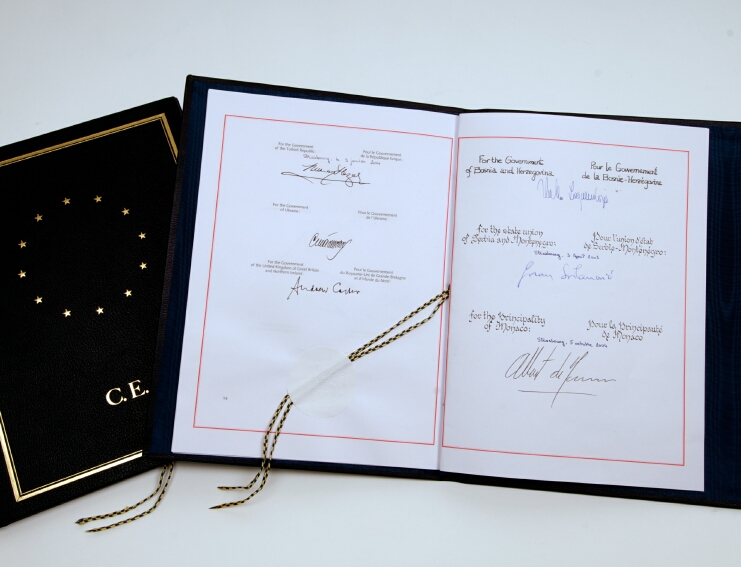Reservations to International Treaties

The terms of reference of the CAHDI specifically require it to "continue its active role as the European Observatory of Reservations to International Treaties".
Role of the European Observatory of Reservations to International Treaties
As a part of its role as European Observatory of Reservations to International Treaties, the CAHDI regularly considers outstanding reservations and declarations to international treaties. This covers both conventions concluded outside the Council of Europe, in particular those drawn up within the United Nations, and conventions concluded within the Council of Europe.
In practice, delegations present any comments they have on problematic outstanding reservations, as well as their respective positions on them.
If certain delegations have doubts about the validity of a reservation or a declaration to an international treaty, they may initiate dialogue on the matter and ask the state concerned for additional information on the reservation and the reasons for it.
Promotion of reservations dialogue
Reservations dialogue enables states to exchange views with another state which has formulated an outstanding reservation with a view to persuading it to reconsider or withdraw it. The practice has no legal effect in that it does not alter the relationships established between states by the reservation or force the state having made the reservation to alter its position. Reservations dialogue is accordingly promoted by the CAHDI.
At the 18th meeting of the CAHDI (Strasbourg, 7-8 September 1999), the committee held an exchange of views, reflected in the meeting report, on the question of reservations dialogue. Delegations underlined the importance of understanding the reasons why states formulated reservations before formally objecting to them.
History of the European Observatory of Reservations to International Treaties
"The law and practice relating to reservations to treaties, in particular as regards human rights treaties" was included on the CAHDI's agenda as from its 9th meeting (Strasbourg, 21-22 March 1995).
At that meeting, delegations held an exchange of views on the question of reservations to human rights treaties. The issue of the universality of human rights was taken into account, in particular because of the many reservations made to human rights treaties on cultural or religious grounds.
The CAHDI expressed its concern about the practice of formulating reservations which were considered inadmissible, either because of their general nature or because they applied to core articles of the treaties. It noted that states adopted two approaches here: 1) either such reservations were considered null and void and the state which lodged them remained bound by the whole of the treaty or 2) it was deemed that there was no consent to be bound if the reservation concerned was considered a condition of acceptance of the relevant provisions by the state lodging the reservation.
At the 14th meeting of the CAHDI (9-10 September 1997), several delegations noted a degree of harmonisation in Council of Europe member states' practice regarding reservations and envisaged a closer co-ordination.
In order to "consider the possible role of the CAHDI as an ‘observatory' of reservations to multilateral treaties", a Group of Specialists on Reservations to International Treaties (DI-S-RIT) was set up. On the basis of its discussions (Paris, 26-27 February 1998 and 14-16 September 1998), the group concluded that a corresponding mechanism should be established. A Group of Experts on Reservations to International Treaties (DI-E-RIT) was assigned that task (16th meeting, Paris, 17-18 September 1998).
At the 17th meeting (Vienna, 8-9 March 1999), the DI-E-RIT presented to the CAHDI a draft recommendation on responses to inadmissible reservations to international treaties. The draft was submitted by the CAHDI to the Committee of Ministers for adoption and led to Recommendation R (99) 13 of the Committee of Ministers to member states on responses to inadmissible reservations to international treaties, which was adopted on 18 May 1999 at the 670th meeting of the Ministers' Deputies.
At the 19th meeting (Berlin, 13-14 March 2000), the CAHDI adopted a document entitled "Practical issues regarding reservations to treaties". The Committee of Ministers took note of the document at the 708th meeting of the Ministers' Deputies in decision 708/10.5 of 3 May 2000.
Since its 20th meeting (Strasbourg, 12-13 September 2000), the CAHDI has itself compiled and considered outstanding reservations to international treaties.
Special guests
The study on reservations conducted by Alain Pellet as rapporteur of the International Law Commission led to the adoption by the International Law Commission at its 63rd session in 2011 of the Guide to Practice on Reservations to Treaties.
At the 34th meeting (Strasbourg, 10-11 September 2007), Professor Pellet again addressed the CAHDI and presented his most recent reports on the issues of reservations to multilateral treaties, while also referring to questions relating to the formulation of objections and reactions to interpretative declarations. He gave details of the conclusions concerning vague or general reservations and those relating to customary norms (see the meeting report).
At the 20th meeting (Strasbourg, 12-13 September 2000), Professor Alain Pellet, Special Rapporteur of the International Law Commission on reservations to multilateral treaties, held an exchange of views with CAHDI members. He reported on the two key aspects of his fifth report on reservations to international treaties: alternatives to reservations and the procedure relating to reservations and interpretative declarations (see the meeting report).



